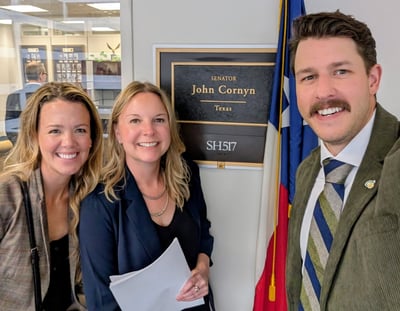 |
|
On October 1, a new face will be behind the Executive Director’s desk at SAA. Katie Hall, currently the Senior Director of Advocacy for Iowa Soybean Association, is transitioning to take over from current SAA chief Easton Kuboushek. He will continue to assist SAA in other capacities.
A 2008 graduate of Iowa State University, Katie earned degrees in Logistics Supply Chain Management and Economics; she also studied Chinese and Public Relations. After nearly 3 years managing logistics at and finding ways to save money for Walmart in Illinois and Maine, she accepted an offer from ADM to return to Iowa as a logistics and commodity merchandiser — where she began trading soybeans. Eventually she moved into other commodities and then into government affairs, heading up lobbying efforts for the Iowa Institute for Cooperatives. After working for the statewide association, she transitioned into a multi-state government relations role with Cargill.
“To move from trading and logistics to lobbying, might seem like a perplexing change to some,” she explains, “but it made a lot of sense to me. I really enjoy following up on things, getting to know people, building relationships, and trying to make things better for Iowans.”
She intends to continue seeking solutions to ease the way for aquaculture farms. “It may be a 3- to 5-year legislative effort for SAA to really move the needle, to get the right people engaged in understanding what the issues are,” she notes.
Outside of work, Katie enjoys volunteering, particularly as VP of the Clive Community Foundation — an Iowa group that seeks to improve quality of life for residents by promoting charitable giving and connecting donors with worthy local causes: “It feels good to do good and help our community along the way.”
|
SAA ADVOCATES FOR MARA ACT ON CAPITOL HILL
|
 |
|
Friends in Aquaculture,
On September 10-11, Katie Hall, who will soon assume the role of Executive Director, and I participated in the Stronger America Through Seafood (SATS) fly-in to help a nationwide seafood coalition advocate for the Marine Aquaculture Research for America (MARA) Act, to push for stronger U.S. aquaculture policy.
Over the two-day event, this coalition met with more than 50 members of Congress to highlight the potential of offshore aquaculture to bolster domestic seafood production, create new economic opportunities for U.S. soybean farmers through aquafeed demand, and strengthen national food security.
The MARA Act represents a critical step toward building a sustainable, science-based framework for U.S. aquaculture. It’s about new markets for soy, new jobs for coastal and inland communities, and reducing reliance on imports. It would establish a NOAA Office of Aquaculture, launch commercial-scale demonstration projects, and streamline the permitting process to support responsible growth in the sector.
Overall, we found Senate and House staff receptive to and inquisitive about the bipartisan bill introduced by Sen. Brian Schatz (D-HI) and Sen. Roger Wicker (R-MS). Particularly for soy-producing states, any opportunity to build new markets for soybean farmers and find solutions for trade — in this case, imported seafood — is an opportunity. Obviously there are no guarantees, but I’m optimistic this meaningful legislation lays the groundwork for building long-term demand!
-Easton Kuboushek
|
THE FUTURE OF SEAFOOD IS FARMED
|
|
In 2022, for the first time in history, more global seafood was produced through aquaculture than was harvested from the wild. Wild capture will always be a critical part of seafood production, but with the growing demand for seafood worldwide, farmed fish will play an increasingly important role in the future of seafood.
|
PROVEN ADVANTAGES OF SOY IN AQUAFEED
|
|
SAA Research Director Dr. Amrit Bart recently completed a months-long study assessing the advantages of soy’s inclusion in aquafeed over the past several years. Highlights of his findings include:
- Traditional marine-sourced ingredients to feed fish and other aqua-livestock, particularly fish meal and oil for carnivorous species, are less available and more expensive. Soybeans to supplement or supplant these ingredients are renewable, easier to obtain, and more scalable to increasing seafood production
- Some barriers to wider soy protein feeding include: association with deforestation in the Amazon (even though U.S. soy does not contribute to this); difficulty gaining acceptance in some markets; and anti-nutritionals in soy that can interfere with digestion if not addressed
- To this last point, ongoing research is continually exploring methods that are, in fact, making soy a highly digestible aquafeed ingredient that also delivers a balanced amino acid profile compatible with aqua-livestock physiology
- Success stories in feeding soy protein to tilapia, shrimp, and hybrid striped bass
Find more insights from Amrit’s study by downloading our report brief below. The full report, along with his recommendations for SAA to continue promoting soy in aquafeed, will be available in the near future!
|
TRAVEL AWARD
ABSTRACTS DUE SOON
|
|
The George Martin Student Travel Award is offered to help cover the costs for a student to attend and highlight their research at Aquaculture America 2026 in Las Vegas. This is a great opportunity for students to present their work, engage with aquaculture leaders, and grow their professional network at the largest aquaculture conference in the U.S.
|
|
Important Eligibility Requirement - To be considered for a travel award, you must also submit an abstract to the conference by September 28, 2025:
|
|
Application Deadline - December 1, 2025:
|
|
NEW OFFSHORE OPPORTUNITY FOR OHIO FARMERS
|
|
Jerry Bambauer, a soybean farmer and member of Soy Aquaculture Alliance based in Ohio, shares how the ocean offers one of the most promising opportunities for his crops.
|
|
NON-GMO SOY SUPPLY TIGHTENS IN EUROPE
|
|
The 2025/26 season is projected to see a narrower supply of non-GMO soy for Europe.
|
|
DECEMBER 10: SAA Q4 Webinar Focusing on Catfish Research - 2 p.m. CST
|
|